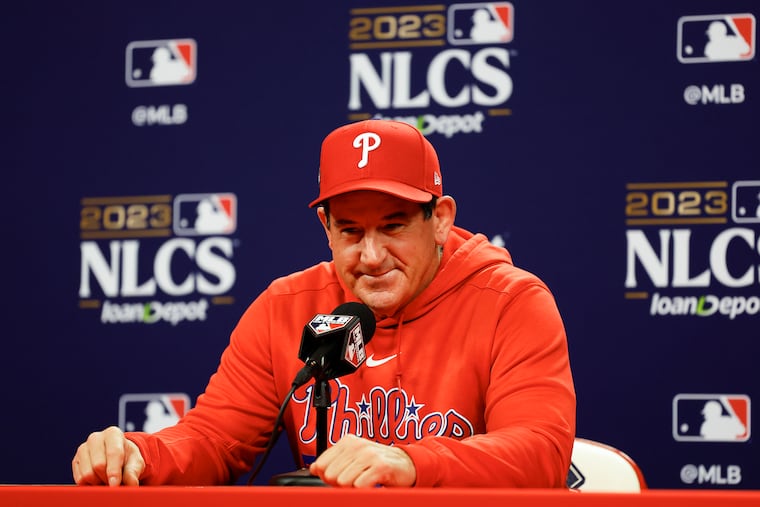Why Rob Thomson believes the speedy Diamondbacks won’t run wild on the Phillies in the NLCS
Arizona stole 166 bases this season, the second most in the National League, and were led by rookie Corbin Carroll's 54.

Even before scanning the detailed reports from the scouts and analysts, the Phillies’ coaching staff had a good idea of the biggest challenge posed by the Arizona Diamondbacks.
“They run,” manager Rob Thomson said Saturday. “And when you think they’re done running, they’re going to run some more.”
Indeed, the Diamondbacks tend to generate offense with their speed. They swiped 166 bases in the regular season, second-most in the National League, led by 54 from rookie Corbin Carroll. They also led the majors with 36 sacrifice hits.
» READ MORE: Five NLCS story lines for the Phillies vs. the Diamondbacks.
Oh, and for the analytically inclined, Arizona ranked first with 21 runs above average created by baserunning events, including steals (and attempts), passed balls, wild pitches, and defensive indifference.
With the National League Championship Series set to open Monday night, it could present a problem for the Phillies, who have several pitchers with notoriously slow moves to the plate. The Diamondbacks are expected to test that potential weakness.
But late in the season, after allowing four steals in a Sept. 4 game in San Diego, the Phillies got proactive in addressing the issue, according to Thomson. J.T. Realmuto threw out only 22% of base-stealers, down from 44% last year, because the pitchers weren’t giving him enough of a chance.
“The coaching staff, we got together and talked to certain guys that needed to speed up a little bit,” Thomson said. “Certainly Aaron [Nola] has done a tremendous job at it. There’s been a conscious effort throughout the staff.”
Nola, the Game 2 starter, notably struggled to adapt to the 15- and 20-second pitch clocks that were implemented before the season. In 32 starts, he allowed 21 stolen bases. With runners on base, opponents slugged .482 with an .816 OPS, compared to .396 and .652 with the bases empty.
But at pitching coach Caleb Cotham’s urging, Nola tweaked his delivery late in the season to control the running game. Specifically, he moved to a slide step, in which he minimized his leg kick.
It’s an adjustment that Nola resisted in the past because he thought it affected the effectiveness of certain pitches. But Cotham asked him to try the slide step in the bullpen, then showed him pitch data that proved the spin on his curveball and other metrics were unchanged.
» READ MORE: When do the Phillies unleash reliever Orion Kerkering? Francisco Rodríguez could be a blueprint.
“Just squaring my shoulders up and stepping more straight to the plate has definitely helped a lot,” Nola said. “Especially with when I’m in the stretch, not over-rotating my upper body too much, it’s definitely helped me get on top of the ball a little bit better.”
It isn’t only Nola. Late-inning relievers, particularly closers, often have trouble holding runners. The Phillies believe Craig Kimbrel will be more effective after making a few late-season adjustments.
In the four-game divisional round, the Phillies held the Atlanta Braves to two stolen bases, both by major-league steals leader Ronald Acuña Jr. The Marlins thought they could run on Nola in the wild-card series, but he picked off Jon Berti at second base in a momentum-turning play in Game 2.
“Each start, he’s used [the slide step] more often,” Thomson said. “It’s been great. He’s 1.2 [seconds] to the plate. And it throws the hitter off at times. Slide-step changeup or slide-step breaking ball, they’re gearing up, and, all of a sudden, it’s on top of you.”
Count on the Diamondbacks testing Nola, Kimbrel, and others.
Carroll provides elite athleticism atop the order, with an average sprint speed of 30.1 feet per second, according to Statcast. (Trea Turner, widely regarded among the fastest runners in baseball, averaged 30.2 feet per second.)
But it isn’t only Carroll. Center fielder Alek Thomas ranked among the best baserunners in the game; shortstop Geraldo Perdomo has speed at the bottom of the order; top prospect Jordan Lawlar has been used off the bench as a pinch-runner. It’ll be interesting to see if Arizona adds fleet outfielder Jake McCarthy to the NLCS roster.
Regardless, Thomson said he thinks the Phillies are prepared to control the running game.
“If you asked me that question a month ago, I would’ve had a different answer,” he said. “But yeah, our guys are conscious of it and trying to speed up, trying to give J.T. a chance. I feel good about it.”
Extra bases
Taijuan Walker and Cristopher Sánchez, candidates to start Game 4, were scheduled to face hitters in a simulated game, but it got rained out. It’s likely the Phillies will set up a similar session for them Sunday. ... Thomson said the Phillies hadn’t decided on potential roster changes for the NLCS. Because it’s a best-of-seven series, it seems likely they will stick with 13 pitchers. ... The Phillies and Diamondbacks will hold pre-series workouts Sunday at Citizens Bank Park.